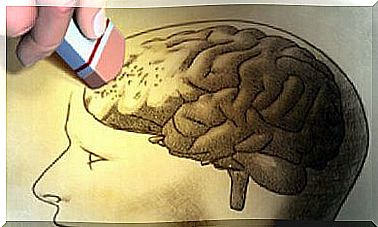The Harmful Effects Of Sugar On The Brain

Nutrition science discourses have changed a lot over the years. With the latest research, it has been discovered that one of the main enemies of health and causes of obesity is sugar. However, many people do not know what the effects of sugar on the brain are, far more harmful than we might imagine.
In addition to being related to heart disease or diabetes, sugar causes many kinds of problems in our minds. In this article you will find out which ones are the most worrying. However, before we get into this subject, it is necessary to let go of some of the myths about this substance.
Is sugar bad?
Growing up, we were bombarded with a series of totally false ideas about food and nutrition. For example, the belief that the main risk factor for suffering from heart disease is fat consumption.

For a long time, sugar was promoted as a completely harmless substance and without any harmful effects on health. However, in the year 2016 a survey revealed that the sugar industry bribed several researchers throughout history. Your objective? Hide all the harmful effects of this substance, which we now know to be linked to cancer and other heart disease.
Perhaps more worrisome are the latest findings about the effects of sugar on the brain. Next, let’s look at five of the most important ones.
Main effects of sugar on the brain
causes addiction
Although it sounds like a myth, sugar addiction is a real problem. This disorder affects more and more people, who feel they need to consume greater amounts of this substance to feel good. In fact, people who have eliminated sugar from their lives speak of very unpleasant symptoms during the first few days.
For example, when putting sugar aside, people may experience headaches, nausea, muscle weakness, anxiety, and drops in blood pressure. Fortunately these symptoms are not permanent, they only last until the body adapts to function without the substance.
How does this addiction work? When absorbed by our body, sugar releases a lot of endorphins in our brain. So, we feel less and less pleasure with the rest of our lives, and we need to eat sugar to feel good.
Causes memory and learning problems
A University of California study on the effects of consuming fructose (one of the types of sugar found in vegetables, fruits and honey) found that it negatively affects the formation of synapses in the brain. That is, by consuming too much fructose, our ability to learn and form new connections is diminished.
On the other hand, other research has also shown that people who consume a lot of fructose have lower levels of FNDC. This substance, whose initials stand for “brain-derived neurological factor,” has a fundamental effect on our ability to generate new memories and learn new information.
Even some studies suggest that sugar consumption may have a direct relationship with Alzheimer’s. In fact, the medical community has considered classifying this disease as type 3 diabetes.
affects our mood
It’s not just our cognitive abilities that are in danger. When ingesting glucose, our moods vary in extreme ways. Due to their effects on insulin in our bodies, sugar spikes can trigger depression, anxiety and sudden mood swings.
In the long run, these effects can get even worse. When we ingest glucose, our brain releases serotonin, one of the pleasure-related neurotransmitters. However, the reserves of this substance are not infinite: when they are continuously emitted, there will be less and less amount left in the brain.
Therefore, it is very difficult to feel positive emotions continuously for people who consume a lot of sugar for a long time.

Keeps us from feeling satiated
Lastly, recent research has found that glucose “hijacks” our satiety mechanism. Because of this, ingesting too much of this substance will make us feel hungry all the time. This is highly related to obesity and overweight problems.
The problem is caused by the effect of sugar on oxytocin and its functions in the brain. One of the roles of this neurotransmitter is to let our bodies know we are full. However, glucose prevents this function from being performed.
Sugar intake has numerous undesirable effects on our body. However, the consequences can be even more troubling for our brains. If you want to maintain good physical and mental health, try to reduce your sugar intake as much as possible.









